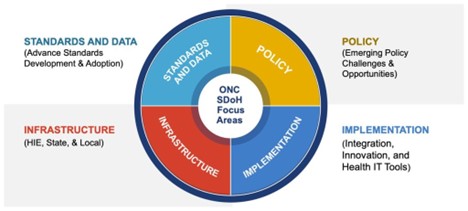
Patient experiences
An integral aspect of delivering comprehensive healthcare involves recognizing the social and environmental factors that influence individuals' lives beyond the healthcare system. Once the screening and identification of health-related social needs (sometime referred as social determinants of health (SDOH)) have taken place, it becomes essential to utilize this information to enhance holistic patient care across all healthcare settings and ensure optimal patient experiences. When designing workflows and configuring electronic health record (EHR) systems, it is crucial to prioritize the advancement of SDOH interoperability, enabling providers to deliver person-centered care effectively and create a positive patient experience.
The Office of the National Coordinator for Health Information Technology (ONC) has outlined four key areas to leverage health IT in advancing the interoperability and utilization of SDOH. This framework provides health systems with valuable guidance for policy creation, technology development, and implementation strategies:
- Standards and Data: Foster the development and adoption of standards to ensure consistent representation and exchange of SDOH data.
- Policy: Address emerging policy challenges and opportunities related to SDOH integration and interoperability.
- Infrastructure: Collaborate with health information exchanges (HIEs), state agencies, and local organizations to establish the necessary infrastructure for sharing SDOH data.
- Implementation: Promote the integration of SDOH data into health IT tools and encourage innovation in leveraging technology for addressing social needs.
To achieve optimal well-being and care delivery, various stakeholders including healthcare providers, community-based organizations, government agencies, payers, health information exchange networks, and health IT platform developers must collaborate. It is important to develop standards that facilitate the exchange of SDOH data on a national or global scale, ensuring that patients receive consistent, high-quality care experiences regardless of their social circumstances.
At the local level, healthcare systems should ensure the use of standardized, structured SDOH data within their EHR systems across all settings which includes ambulatory, acute care, homecare, and post-acute care. However, deciding how to get started can be difficult. The Social Determinants of Health Resources guide from NCQA (20201009_SDOH-Resource_Guide.pdf (ncqa.org)) provides a comprehensive tool for starting this journey.

Figure: ONC Health IT Framework for Advancing SDOH Data Use and Interoperability - Health IT Buzz.
It is also important to recognize that many community resources may not have their own EHR systems. Therefore, the use of standardized, structured SDOH data becomes critical for achieving interoperability. Developing SDOH data and workflows in collaboration with community resources, agencies, and other regional health systems plays a vital role in addressing the social needs of patients effectively.
By embracing the ONC's framework and prioritizing SDOH interoperability, healthcare systems can enhance their ability to deliver holistic, person-centered care, resulting in optimal patient experiences. The integration of SDOH data into healthcare workflows and systems empowers providers to address the broader social factors impacting health outcomes, ultimately improving patient experiences, satisfaction, and overall well-being.
References
Henry, J., & Meklir, S. (2021, June 17). ONC Health IT Framework for Advancing SDOH Data Use and Interoperability - Health IT Buzz Health IT Buzz. Retrieved June 11, 2023 from https://www.healthit.gov/buzz-blog/interoperability/onc-health-it-framework-for-advancing-sdoh-data-use-and-interoperability
Read more
Nursing Impact on Social Determinants of Health (SDOH) Part 2



